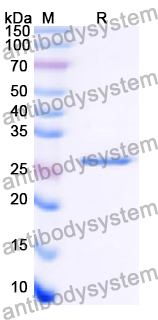Catalog No.
YHE42101
Expression system
E. coli
Species
Homo sapiens (Human)
Protein length
Ser96-Glu314
Predicted molecular weight
27.19 kDa
Nature
Recombinant
Endotoxin level
Please contact with the lab for this information.
Purity
>90% as determined by SDS-PAGE.
Accession
P43360
Applications
ELISA, Immunogen, SDS-PAGE, WB, Bioactivity testing in progress
Form
Lyophilized
Storage buffer
Lyophilized from a solution in PBS pH 7.4, 0.02% NLS, 1mM EDTA, 4% Trehalose, 1% Mannitol.
Reconstitution
Reconstitute in sterile water for a stock solution. A copy of datasheet will be provided with the products, please refer to it for details.
Shipping
In general, proteins are provided as lyophilized powder/frozen liquid. They are shipped out with dry ice/blue ice unless customers require otherwise.
Stability and Storage
Use a manual defrost freezer and avoid repeated freeze thaw cycles. Store at 2 to 8°C for frequent use. Store at -20 to -80°C for twelve months from the date of receipt.
Alternative Names
MAGEA6, Cancer/testis antigen 1.6, MAGE6, MAGE3B antigen, MAGE-6 antigen, CT1.6, Melanoma-associated antigen 6
Gene and Protein Expression of MAGE and Associated Immune Landscape Elements in Non-Small-Cell Lung Carcinoma and Urothelial Carcinomas., PMID:39169899
Low-dose hypomethylating agents cooperate with ferroptosis inducers to enhance ferroptosis by regulating the DNA methylation-mediated MAGEA6-AMPK-SLC7A11-GPX4 signaling pathway in acute myeloid leukemia., PMID:38378601
Diagnostic performance of anti-MAGEA family protein autoantibodies in esophageal squamous cell carcinoma., PMID:37866309
TGM2, HMGA2, FXYD3, and LGALS4 genes as biomarkers in acquired oxaliplatin resistance of human colorectal cancer: A systems biology approach., PMID:37535601
Body composition and lung cancer-associated cachexia in TRACERx., PMID:37045997
Suitability of tumor-associated antibodies as predictive biomarker for response to immune checkpoint inhibitors in patients with melanoma: a short report., PMID:36750254
Molecular Characteristics of Bladder Tumor: Increased Gene Expression of MAGE-A6 and MAGE-A11 with Decreased MicroRNA-34a and MicroRNA-125b., PMID:36341564
Identification of hub genes in AR-induced tamoxifen resistance in breast cancer based on weighted gene co-expression network analysis., PMID:36334189
DDX17 promotes the growth and metastasis of lung adenocarcinoma., PMID:36273228
Chemical complementarity between tumor resident, T-cell receptor CDR3s and MAGEA3/6 correlates with increased melanoma survival: Potential relevance to MAGE vaccine auto-reactivity., PMID:35987136
Identification of a seven-gene signature predicting clinical outcome of liver cancer based on tumor mutational burden., PMID:35622212
Multivariant Transcriptome Analysis Identifies Modules and Hub Genes Associated with Poor Outcomes in Newly Diagnosed Multiple Myeloma Patients., PMID:35565356
Knockdown of MAGE-A6 enhanced the irradiation sensitivity of non-small cell lung cancer cells by activating the AMPK pathway., PMID:35285568
Differential gene expression and network analysis in head and neck squamous cell carcinoma., PMID:35142951
MAGEA6 positively regulates MSMO1 and promotes the migration and invasion of oesophageal cancer cells., PMID:35126707
Co-expression of cancer-testis antigens of MAGE-A6 and MAGE-A11 is associated with tumor aggressiveness in patients with bladder cancer., PMID:35022469
Identification of Key Genes Associated with Progression and Prognosis of Bladder Cancer through Integrated Bioinformatics Analysis., PMID:34885040
Genomic Instability of Mutation-Derived Gene Prognostic Signatures for Hepatocellular Carcinoma., PMID:34676211
Multiomics Differences in Lung Squamous Cell Carcinoma Patients with High Radiosensitivity Index Compared with Those with Low Radiosensitivity Index., PMID:34504628
Transcriptional overlap links DNA hypomethylation with DNA hypermethylation at adjacent promoters in cancer., PMID:34462486
Potential biomarkers and lncRNA-mRNA regulatory networks in invasive growth hormone-secreting pituitary adenomas., PMID:33559847
The Arg/N-degron pathway targets transcription factors and regulates specific genes., PMID:33229537
A comprehensive analysis of the MAGE family as prognostic and diagnostic markers for hepatocellular carcinoma., PMID:32941982
Clinical significance of long non-coding RNA DUXAP8 and its protein coding genes in hepatocellular carcinoma., PMID:32922554
The roles of MAGEA6 variants in pancreatic cancer development and their potential impact on cancer immunotherapy., PMID:32809888
Differential expression of MAGEA6 toggles autophagy to promote pancreatic cancer progression., PMID:32270762
Identification of key genes and pathways in gastric signet ring cell carcinoma based on transcriptome analysis., PMID:32149050
Lnc-THOR silencing inhibits human glioma cell survival by activating MAGEA6-AMPK signaling., PMID:31727877
Tissue Expression of Melanoma-associated Antigen A6 and Clinical Characteristics of Gastric Cancer., PMID:31704814
Epigenetic Coactivation of MAGEA6 and CT-GABRA3 Defines Orientation of a Segmental Duplication in the Human X Chromosome., PMID:31593956
Investigation into the expression levels of MAGEA6 in esophageal squamous cell carcinoma and esophageal adenocarcinoma tissues., PMID:31410142
Regulation of MAGE-A3/6 by the CRL4-DCAF12 ubiquitin ligase and nutrient availability., PMID:31267705
microRNA-448 inhibits stemness maintenance and self-renewal of hepatocellular carcinoma stem cells through the MAGEA6-mediated AMPK signaling pathway., PMID:31232474
MAGE-A expression in oral and laryngeal leukoplakia predicts malignant transformation., PMID:30936424
miR-1273g silences MAGEA3/6 to inhibit human colorectal cancer cell growth via activation of AMPK signaling., PMID:30056111
Knockdown of MAGEA6 Activates AMP-Activated Protein Kinase (AMPK) Signaling to Inhibit Human Renal Cell Carcinoma Cells., PMID:29448247
MAGE-A gene expression in peripheral blood serves as a poor prognostic marker for patients with lung cancer., PMID:29430849
RNAi-mediated knockdown of Parp1 does not improve the development of female cloned mouse embryos., PMID:29050247
MAGEA6 promotes human glioma cell survival via targeting AMPKα1., PMID:29024810
Functional interaction between co-expressed MAGE-A proteins., PMID:28542476
Transcriptional profile of SH-SY5Y human neuroblastoma cells transfected by Toxoplasma rhoptry protein 16., PMID:27666388
The Magea gene cluster regulates male germ cell apoptosis without affecting the fertility in mice., PMID:27226137
Isolation and Characterization of an HLA-DPB1*04: 01-restricted MAGE-A3 T-Cell Receptor for Cancer Immunotherapy., PMID:27163739
Expression of MAGE-A1-A12 subgroups in the invasive tumor front and tumor center in oral squamous cell carcinoma., PMID:26820613
Development of a Quantitative Real-Time RT-PCR Assay for the Detection of MAGE-A3-Positive Tumors., PMID:25986000
Oncogenic MAGEA-TRIM28 ubiquitin ligase downregulates autophagy by ubiquitinating and degrading AMPK in cancer., PMID:25945414
MAGE-A expression clusters and antineoplastic treatment in head and neck cancer., PMID:25872923
Degradation of AMPK by a cancer-specific ubiquitin ligase., PMID:25679763
The inactive X chromosome is epigenetically unstable and transcriptionally labile in breast cancer., PMID:25653311
A Comprehensive Expression Analysis of Cancer Testis Antigens in Head and Neck Squamous Cell Carcinoma Revels MAGEA3/6 as a Marker for Recurrence., PMID:25564441

